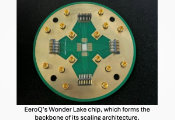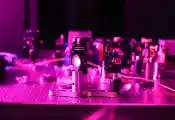NUS Researchers and Alumnus Contribute to Major Quantum Computing Milestone at JPMorganChase
April 09, 2025 -- A team of researchers has demonstrated possibly the first practical application of quantum computing using commercially available hardware — a milestone that unlocks the long-term promise and potential of quantum technologies. The major breakthrough, published in Nature on 25 March 2025, shows that quantum computers could be used to generate certified random numbers that are mathematically proven to be unpredictable — a foundational capability for secure banking, cryptography and digital services.
Associate Professor Charles Lim, who is on leave from the National University of Singapore (NUS), introduced the idea of certified quantum randomness to the bank, where a research team collaborated with US national laboratories and universities to bring the idea to reality. A quantum cryptography expert from the Department of Electrical and Computer Engineering in the College of Design and Engineering (CDE) at NUS, Assoc Prof Lim is currently leading networking and security research at JPMorganChase.
Two other NUS-affiliated researchers also made significant contributions to the paper: Dr. Kon Wen Yu, a PhD graduate from NUS CDE, and Enrique Cervero-Martín, a PhD student at the Centre for Quantum Technologies at NUS, both of whom were mentored by Assoc Prof Lim at JPMorgan.
Realising certified randomness
The research addresses a long-standing challenge in quantum computing: demonstrating a useful task that near-term quantum computers can perform beyond the reach of even the most powerful classical supercomputers. Random number generation — essential for encryption, secure authentication, digital lotteries and e-games — has long been seen as a promising application. However, proving the quality and freshness of such randomness has remained difficult to achieve.
To solve this, the team implemented a protocol known as certified randomness, based on a method called random circuit sampling. The protocol involves sending quantum “challenge” circuits to a remote quantum computer, analysing its responses and then using classical supercomputers to certify that the results could not have been feasibly simulated by any classical means. The experiment was performed using the 56-qubit Quantinuum H2-1 trapped-ion quantum processor, accessed remotely over the internet.
In addition to verifying the authenticity of the output, the researchers also demonstrated randomness expansion, in which more certified random bits than the initial randomness used to initiate the process are produced. Combining quantum processing with exascale classical computing, the researchers successfully certified over 71,000 bits of entropy, producing what is known to be the first experimental realisation of certified randomness using existing quantum hardware.
The breakthrough comes at a time when expectations around, and investments in, quantum computing are high. While a fully functional general-purpose quantum computer is only expected in five to seven years, this study provides a proof point for what today’s intermediate-scale quantum devices can achieve — with immediate relevance to secure key generation and cryptographic protocols that require trusted randomness.
From academia to industry and back
Assoc Prof Lim’s key involvement in the project reflects the practicality of close academia-industry collaboration in advancing critical areas of research. In 2022, Assoc Prof Lim took no-pay leave from NUS to lead JPMorgan’s global quantum research team, which enables him to apply his research in real-world contexts while maintaining his academic roots and contributing to national and international initiatives to forge new frontiers in quantum computing.
At NUS, Assoc Prof Lim has built a strong research portfolio in quantum cybersecurity and quantum integrated photonics, particular in quantum key distribution (QKD) and quantum random number generation (QRNG). His work includes landmark demonstrations such as one of the world’s first device-independent QKD systems (Nature, 2022) and a proposal for chip-based QRNG with certified randomness (Nature Communications, 2023). He is also a National Research Foundation Fellow, a recipient of Singapore’s Young Scientist Award (2019) and an active contributor to international standardisation efforts for quantum cryptography.




































